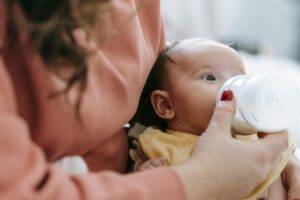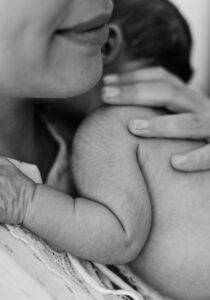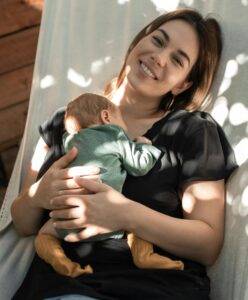As a new parent, it comes naturally to pay close attention to every little sound or movement your newborn makes. One common experience that surprises parents is hearing their newborn baby hiccups. While baby hiccups are normal, they can be concerning if you don’t know what’s causing them or how to stop them.
In reality, newborn hiccups are generally harmless and signal your baby is developing as expected. This article will explore why a newborn baby hiccup frequently, the possible causes, and practical solutions to help reduce hiccups in your little one. Plus, we’ll touch on when hiccups signal something more serious and how to prevent them from becoming a problem.
What Are Baby Hiccups?
Hiccups happen when the diaphragm, the muscle that helps control breathing, contracts suddenly and involuntarily. This quick contraction sucks air into the lungs, but as the air rushes in, the vocal cords snap shut, creating that distinctive “hic” sound. Everyone experiences hiccups at some point, but babies seem to get them more frequently than adults, often multiple times a day.
Why Are Newborn Hiccups So Common?
The frequent occurrence of hiccups in newborns is largely due to their developing bodies. Unlike adults or older children, babies’ diaphragms and digestive systems are still maturing, which means they’re more sensitive to triggers that cause the diaphragm to contract.
Additionally, newborns spend a lot of time feeding, crying, and swallowing air, all of which trigger hiccups. Interestingly, babies even have hiccups in the womb! It’s common for expectant mothers to feel their baby’s hiccups during the later stages of pregnancy. This early occurrence shows that hiccups are a natural part of a baby’s development and continue after birth.
Are Hiccups Harmful to My Baby?
The good news is that hiccups are generally harmless in newborns. They might look or sound uncomfortable; in most cases, hiccups aren’t bothersome. Many babies continue feeding, playing, or sleeping without noticing their hiccups. If your baby seems happy, and not distressed by the hiccups, there’s no need for concern. However, you want to know how to prevent hiccups or help them stop more quickly. Let’s dive into the common causes and how to manage them.
Common Causes of Newborn Baby Hiccups
Newborn baby hiccups occur for many reasons, but understanding the most common causes helps minimize their frequency. Below, we’ll explore why newborns tend to get hiccups and what you can do about it.
1. Immature Diaphragm Development
This is one of the main reasons why a newborn baby hiccups. The diaphragm controls the baby’s breathing and may be prone to sudden contractions, especially when triggered by feeding, swallowing air, or temperature changes. These muscle spasms cause air to rush into the lungs, leading to hiccups.
Newborn diaphragms are also sensitive because they’re used to regulating breathing patterns outside the womb. This sensitivity is normal and tends to decrease as babies grow and their diaphragm matures.
2. Feeding-Related Hiccups
One of the most common triggers for newborn baby hiccups is feeding. Whether breastfed or bottle-fed, babies swallow too much air while eating. This happens more frequently if a baby feeds too quickly, which causes hiccups. A full stomach pressing up against the diaphragm leads to hiccuping.
Bottle-fed babies are prone to swallowing air, especially if the bottle’s nipple is fast-flowing or if there’s too much air inside the bottle. Breastfed babies, on the other hand, might get hiccups if they’re gulping milk too fast or switching between breasts too quickly.
3. Overfeeding
When a baby’s stomach becomes overly full, it presses against the diaphragm and causes it to spasm, leading to hiccups. Newborns have small stomachs, so overfeeding is easier than you might think, especially if they’re still developing feeding cues.
4. Temperature Changes
When a baby gets cold or too warm, it causes the diaphragm to contract. This happens if you change your baby’s clothing, bathe them, or move them from one room to another with a different temperature.
5. Gastroesophageal Reflux (GER)
Newborn baby hiccups may be related to GER when stomach contents backflow into the esophagus. GER is common in infants because their digestive systems are still maturing. When acid reflux irritates the diaphragm, it triggers hiccups. Babies with GER spit up more frequently and show discomfort during or after feeding.
Typically, GER-related hiccups aren’t a cause for alarm. However, chronic or severe reflux (known as gastroesophageal reflux disease, or GERD) requires monitoring by your pediatrician, as it can lead to other complications if left untreated.
Practical Solutions to Prevent and Manage Baby Hiccups

Though hiccups are mostly harmless, you may want to reduce their frequency, especially if they happen during feeding or interrupt sleep. Here are some practical tips to prevent and manage your baby’s hiccups:
- Feed Your Baby More Slowly: When babies feed too fast, they swallow more air, triggering hiccups. Try slowing down the feeding pace by taking frequent breaks to allow your baby to rest and digest. If you’re bottle-feeding, using a slow-flow nipple can help regulate the speed at which your baby drinks, reducing the chances of gulping air. For breastfeeding moms, try pacing your baby’s feeding by switching breasts or taking breaks to let your baby burp.
- Burp Your Baby Frequently: Help your baby release trapped air from their stomach by burping, especially during feeding. You also reduce the likelihood of it irritating the diaphragm. Ideally, you should burp your baby every 2-3 ounces during bottle feeding or between switching breasts when breastfeeding. Even after your baby finishes feeding, holding them upright and burping them help keep hiccups at bay.
- Hold Your Baby Upright After Feeding: When babies lie down immediately after eating, the milk or formula can sometimes flow back into the esophagus, triggering hiccups. Keep your baby upright for about 20 to 30 minutes after feeding, you help the milk settle properly in their stomach, reducing the risk of reflux and hiccups.
- Avoid Overfeeding: Paying attention to your baby’s hunger and fullness cues avoids overfeeding. Newborns will often turn their heads away from the bottle or breast, slow their sucking, or push the bottle away when they’re full. Stop feeding when your baby is satisfied, you reduce the risk of overfilling their small stomach, which can lead to hiccups.
- Try Gripe Water: Some parents find that gripe water can help soothe baby hiccups. Gripe water is a natural remedy made from herbs like ginger and fennel, known to calm the stomach and reduce gas. While many parents swear by its effectiveness, consult your pediatrician before giving your baby any supplement or remedy for safety for your baby’s age and health.
How to Soothe Hiccups Once They Start
Even with preventive measures, your baby may still experience hiccups. Fortunately, there are several ways to help soothe hiccups when they happen:
- Pause Feeding and Burp: If your baby starts to hiccup in the middle of a feeding, pause and try to burp them before continuing. Gentle tapping releases any trapped air that might be causing the hiccups. Once they’ve burped, you can resume feeding at a slower pace.
- Offer a Pacifier: Sucking on a pacifier can stop hiccups by helping to relax the diaphragm. The repetitive sucking motion soothes your baby and brings an end to the hiccups. This trick works well for babies who frequently get hiccups after feeding or during quiet times.
- Change Their Position: Changing your baby’s position alleviates hiccups. If your baby is lying down, try sitting them up or holding them upright. This relaxes the diaphragm and stops the hiccup cycle.
- Patience—Let Them Pass: Baby hiccups will go away on their own within a few minutes. If your baby isn’t distressed, you can let the hiccups run their course. Hiccups are a natural reflex and usually don’t require intervention unless they’re causing discomfort.
When Should You Worry About Newborn Baby Hiccups
While newborn baby hiccups are almost always harmless, there are rare instances when they signal an underlying issue. Consult your pediatrician if
- Persistent Hiccups: Lasting several hours or seems to occur very frequently
- Accompanying Symptoms: Your baby seems in pain, fussy, or vomits frequently alongside the hiccups.
- Interferes Feeding and Sleep: Your baby seems to be struggling with feeding, and hiccups interrupt their ability to feed or sleep.
Persistent hiccups could indicate gastroesophageal reflux disease (GERD), which is more serious than regular reflux. If your baby has GERD, your pediatrician suggests treatments to manage the symptoms and reduce hiccups.
Help Reduce Your Newborn Baby Hiccups
Hiccups in newborns are a common and normal part of their early development. While they may catch you off guard, they’re typically harmless and resolve independently. You can help reduce the frequency of hiccups in your newborn.
If you have concerns about your baby’s hiccups or suspect they might be related to a more serious issue like GERD, seek out your pediatrician. After all, keeping your baby comfortable and healthy is the top priority.
For more parenting tips and guidance on newborn care, check out additional resources on Omega Pediatrics. You’ll find expert advice on baby-related topics, from feeding challenges to sleep tips. Also, consider reading this insightful article on managing baby feeding issues to help keep your baby happy and healthy.
- 10 Quick Tips When Your Newborn Baby is Constipated
- 10 Essential Sleep Techniques Recommended for Breastfeeding Mothers






